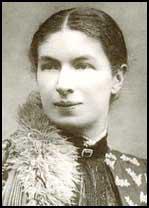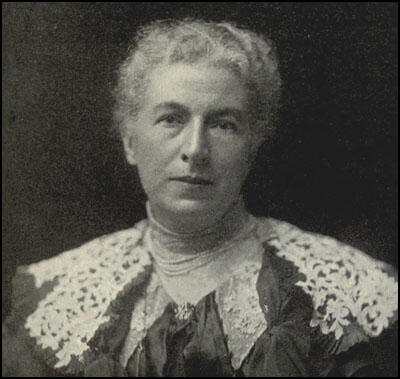Mary Humphry Ward

Mary Augusta Arnold, the grand-daughter of Dr. Thomas Arnold, was born in Hobart, Tasmania in 1851. The daughter of Tom Arnold, a professor of literature, two of her uncles were Matthew Arnold and William Forster. Mary returned to England with her family in 1856 and was brought up in Oxford.
Mary was a difficult child. Tom Arnold wrote that he had "a regular pitched battle with her about once a day... her domineering spirit makes even her kindness partake of oppression." Another person who knew her described her as "passionate and wilful" and that she was quick to lose her temper.
At the age of ten she was sent away to board at the Rock Terrace School for Young Ladies at Shifnal. In 1864 she moved to a school in Clifton. She later wrote: "I learnt nothing thoroughly or accurately, and the German, French and Latin, which I soon discovered after my marriage to be essential to the kind of literary work I wanted to do, had all had to be relearnt before they could be of any real use to me."
In 1871 Mary met Thomas Humphry Ward, a 25-year-old tutor and newly elected fellow at Brasenose College. Mary said yes when Thomas proposed marriage and the Reverend Charles Dodgson (Lewis Carroll), who had used Mary's younger sisters as child models, took their engagement photographs. They married in 1872.
Mary Humphry Ward later wrote: "It became plain very soon after our marriage that ours was to be a literary partnership... our three small children arrived in 1874, 1876 and 1879 and all the time I was reading, listening, talking and beginning to write in earnest - mostly for the Saturday Review. Mary spent her mornings in Bodleian Library and wrote for three hours every evening after the children went to bed.
In 1881 Thomas Humphry Ward was offered a job as leader writer for The Times. The couple moved to London and soon afterwards Mary had her first book, Millie and Olly (1881) published. Her second novel, Miss Bretherton appeared in 1884. These books sold badly but her next novel, Robert Elsmere (1888) was an instant success and sold over 500,000 copies within a year and over the next few years was translated into several different languages.
Books such as The History of David Grieve (1892), Marcella (1894), Sir George Tressaday (1896) and Helbeck of Bannisdale (1898) established Ward as one of Britain's most popular novelists. Her publisher's accounts reveal very high sales, with every new novel selling over 100,000 copies in the first six weeks after publication.
Many of Ward's books concerned the need to help the less fortunate in society. However, despite her sympathy for the poor, she was totally opposed to women's suffrage. In 1908 Mary Humphry Ward was approached by Lord Cromer and Lord Curzon and asked to become the first president of the Anti-Suffrage League. Mary agreed and on 8th July, 1908 the organisation published its manifesto. It included the following: "It is time that the women who are opposed to the concession of the parliamentary franchise to women should make themselves fully and widely heard. The matter is urgent. Unless those who hold that the success of the women's suffrage movement would bring disaster upon England are prepared to take immediate and effective action, judgement may go by default and our country drift towards a momentous revolution, both social and political, before it has realised the dangers involved."
Mary Humphry Ward argued the case against women's suffrage at debates at Newnham College and Girton College. Once a role model for educated young women, she received a hostile reception from the students when she told them that the "emancipating process has now reached the limits fixed by the physical constitution of women". She recorded in her diary after the Girton debate that "the fire and the rage were immense" and blamed the staff who she accused of being "hotly suffrage".
Some of the more progressive figures in literature attacked her old-fashioned views. Virginia Woolf claimed that reading her work was like"catching influenza" and Lytton Strachey described her as "that shapeless mass of meaningless flesh - all old and insignificant".
John Sutherland, the author of Mrs Humphry Ward: Eminent Victorian (1990), gives three reasons for her decision to oppose women's suffrage: "A horror of militancy, a fear that women might look ridiculous as political figures, and a tendency to be easily flattered by powerful men such as the ones who persuaded her to take part in this exercise."
The Anti-Suffrage League collected signatures against women having the vote and at a meeting on 26th March, 1909, Mary announced that over 250,000 people had signed the petition. The following June she reported that the movement had 15,000 paying members and 110 branches and the number who had signed the petition had reached 320,000.
Humphry Ward became editor of the journal, the Anti-Suffrage Review and as well as writing a large number of articles on the subject, several of her novels, notably, The Testing of Diana Mallory (1908) and Delia Blanchflower (1915) criticised women's suffrage campaigners.

Her son, Arnold Ward, the Conservative MP for Watford, played a significant role in the House of Commons in trying to prevent women getting the vote. Even during the First World War, when other leading campaigners such as Lord Cromer and Lord Curzon had withdrawn their objections, Ward continued to vote against giving women the franchise.
It was claimed that by 1914 Mary Humphry Ward was the best-known Englishwomen in America. Charles Masterman and Sir Gilbert Parker, of the government's War Propaganda Bureau, suggested that Mary Humphry Ward might like to write a book encouraging the American public to support Britain's war effort. She replied that she would if the government was able to compensate her for the financial "losses from the war and the pressure of war taxation". This was arranged and in March 1915, Mary became the first woman journalist to visit the Western Front. As a result of the tour of the front-line, Mary wrote two books, England's Effort (1916) and Towards the Goal (1917).
Mary Humphry Ward's autobiography, A Writer's Recollections, was published in 1918. Her final years were spent worrying about the debts of her son,Arnold Ward, who was a compulsive gambler. Mary Humphry Ward died on 26th March, 1920. In order to pay Ward's creditors, Thomas Humphry Ward had to sell-off the family home.
Primary Sources
(1) Mary Humphrey Ward, Manifesto of the Women's National Anti-Suffrage League (July, 1908)
It is time that the women who are opposed to the concession of the parliamentary franchise to women should make themselves fully and widely heard. The matter is urgent. Unless those who hold that the success of the women's suffrage movement would bring disaster upon England are prepared to take immediate and effective action, judgement may go by default and our country drift towards a momentous revolution, both social and political, before it has realised the dangers involved.
(2) Mary Humphrey Ward, The Times (27th February, 1909)
Women's suffrage is a more dangerous leap in the dark than it was in the 1860s because of the vast growth of the Empire, the immense increase of England's imperial responsibilities, and therewith the increased complexity and risk of the problems which lie before our statesmen - constitutional, legal, financial, military, international problems - problems of men, only to be solved by the labour and special knowledge of men, and where the men who bear the burden ought to be left unhampered by the political inexperience of women.
(3) In her autobiography, A Writer's Recollections, Mary Humphrey Ward described her visit to the Western Front. Soon after arriving in France she heard about the death of her friend, Henry James.
All through that wonderful day, when we watched a German counter-attack in the Ypres salient from one of the hills south-east of Poperinghe, the ruined tower of Ypres rising from the mists of the horizon, the news was intermittently with me as a dull pain, breaking in upon the excitement and novelty of the great spectacle around us. I was looking over ground where every inch was consecrated to the dead sons of England, dead for her; but even though their ghostly voices came the voice of Henry James, who spiritually, had fought in their fight and suffered in their pain.

